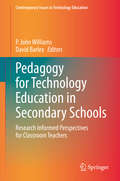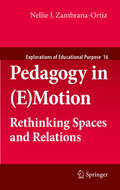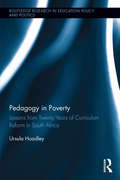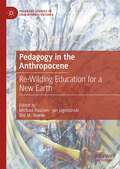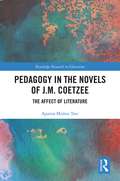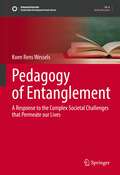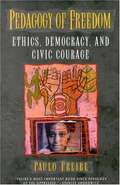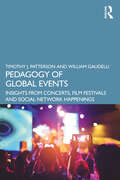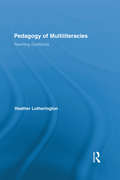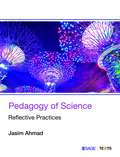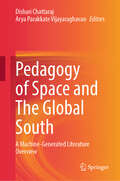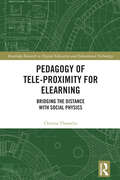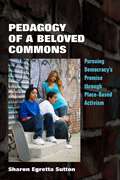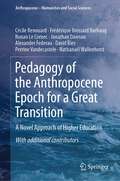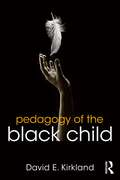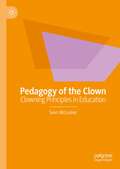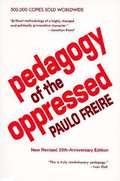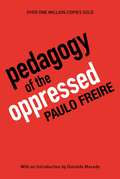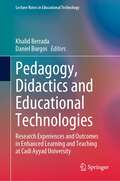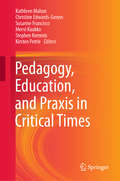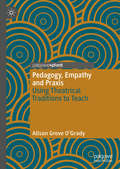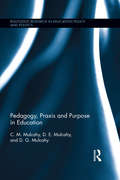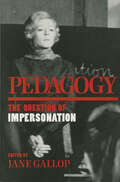- Table View
- List View
Pedagogy for Technology Education in Secondary Schools: Research Informed Perspectives for Classroom Teachers (Contemporary Issues in Technology Education)
by David Barlex P. John WilliamsThis book explores pedagogy appropriate for the secondary school technology education classroom. It covers the dimensions of pedagogy for technology with scholarly research, including information strongly related to practice. The book discusses the nature of technology courses in secondary schools across various jurisdictions and considers how they might be viewed with regard to different epistemological frameworks. The writing is informed by, but not limited to, research and strongly related to practice with acknowledged experts in the field of technology education contributing chapters supported by evidence from technology education research or other fields. The authors speculate on pedagogical possibilities in their areas of expertise in order to consider pedagogical possibilities and develop a view of where pedagogy for technology education should move and how teachers might respond in the way they develop their practice.
Pedagogy in (E)Motion
by Nellie J. Zambrana-OrtizThis personal, creative, critical work from a leading scholar of psychology is rooted in three novel concepts and aims to share critical pedagogy in the spirit of nascent potential found in the context of a colonial Puerto Rico. First comes the idea of 'pedagogy in (e)motion', or the emotional matrix of the teaching and learning process. Secondly, the author explores the notion of 'street pedagogy' as a genuine and powerful professional tool. And thirdly, the book underscores what Zambrana-Ortiz calls 'the interconnection of the artscience within the political and biographical act of teaching'. The purpose is to inform education teaching practice with the radical framework that, like the neurosciences, believes emotions to be a vital precursor to the planning of action, the process of decision-making and the broadening of our cognitive parameters. The chapters focus on different and yet complementary dimensions of a college teaching initiative boasting a unique interplay between a transgressive narrative, reinvented methodology and authentic samples of students' contributions to the project. Traditionally, emotional and visceral experiences have been downplayed and rejected as fundamental components of knowledge. This book makes the case for their reinstatement, and proposes that the pleasure and commitment of teaching itself can be seen as resistance given the challenging social and political context, the bureaucracy of the Puerto Rican higher education system, and the cynicism of the self-confessed cognoscenti who think that little political progress can come from within the university system. Such resistance has proved for the author a source of inspiration and has contributed to her creation and reconceptualization of approaches to critical and useful pedagogy. D edication To my students who inspire many stories and provoke many emotions and challenge my capacities... To Aura, Ignacio and Jaime for their unconditional love and their everyday lessons... A cknowledgments Many friends, mentors and colleages from the University of Puerto Rico and United States were very important pieces to my creative work. Thanks to Donaldo Macedo who encouraged the initial proposal and to Joe Kincheloe for accepting it and bringing guidance in the right moment. Colleages like Roamé Torres and Angeles Molina, from their directive positions, were extremely supportive while Sandra Macksoud, José Solís, Pedro Subirats, and Ada Prabhavat gave me guidance and constant insights in editing and translation, as well as crucial material for my narrative. Juan Vadi enhanced my graphic elements with his talent; while college mentors, current colleages, teachers, and former graduate and undergraduate students allowed me to write their stories and reflections binging fresh accents and life to the book. Thanks for ever!
Pedagogy in Higher Education
by Anne Edwards Gordon WellsWhat can Cultural Historical Activity Theory (CHAT) contribute to the solution of the problems facing higher education today? This edited volume brings together the work of an international group of scholars and researchers to address this important question. Drawing on contemporary interpretations of CHAT, the contributors take on a wide range of issues, ranging from pedagogy to administration and from teacher preparation to university outreach. An introduction presents the key principles of CHAT. Subsequent chapters address such issues as effective ways of teaching large undergraduate classes, providing support for struggling writers or for students with disabilities, opening up opportunities for students from historically underserved communities, preparing students for the professions, and building bridges between higher education and the wider community. Readers with an interest in higher education will encounter ideas in these chapters that will prompt them to rethink their role in preparing today's students for tomorrow's challenges.
Pedagogy in Poverty: Lessons from Twenty Years of Curriculum Reform in South Africa (Routledge Research in Education Policy and Politics)
by Ursula HoadleyAs South Africa transitioned from apartheid to democracy, changes in the political landscape, as well as educational agendas and discourse on both a national and international level, shaped successive waves of curriculum reform over a relatively short period of time. Using South Africa as a germane example of how curriculum and pedagogy can interact and affect educational outcomes, Pedagogy in Poverty explores the potential of curricula to improve education in developing and emerging economies worldwide, and, ultimately, to reduce inequality. Incorporating detailed, empirical accounts of life inside South African classrooms, this book is a much-needed contribution to international debate surrounding optimal curriculum and pedagogic forms for children in poor schools. Classroom-level responses to curriculum policy reforms reveal some implications of the shifts between a radical, progressive approach and traditional curriculum forms. Hoadley focuses on the crucial role of teachers as mediators between curriculum and pedagogy, and explores key issues related to teacher knowledge by examining the teaching of reading and numeracy at the foundational levels of schooling. Offering a data-rich historical sociology of curriculum and pedagogic change, this book will appeal to academics, researchers and postgraduate students in the fields of education, sociology of education, curriculum studies, educational equality and school reform, and the policy and politics of education.
Pedagogy in the Anthropocene: Re-Wilding Education for a New Earth (Palgrave Studies in Educational Futures)
by Jan Jagodzinski Michael Paulsen Shé M. HawkeThis book explores new pedagogical challenges and potentials of the Anthropocene era. The authors argue that this new epoch, with an unstable climate, new kinds of globally spreading viruses, and new knowledges, calls for a new way of educating and an alertness to new philosophies of education and pedagogical imaginations, thoughts, and practices. Addressing the linkages between the Anthropocene and Pedagogy across a broad pedagogical spectrum that is both formal and informal, the editors and their contributors emphasize a re-imagining of education that serves to deepen our understanding of the capacities and values of life.
Pedagogy in the Novels of J.M. Coetzee: The Affect of Literature (Routledge Research in Education)
by Aparna Mishra TarcCritically analyzing the representation of pedagogy in the novels of J.M. Coetzee, this insightful text illustrates the author’s profound conception of learning and personal development as something which takes place well beyond formal education. Bringing together critical and educational theory, Pedagogy in the Novels of J.M. Coetzee examines depictions of pedagogy in novels including Age of Iron, Elizabeth Costello, Disgrace, and Childhood of Jesus. Engaging with Coetzee’s varied literary use of pedagogical themes such as motherhood, maternal love, and the importance of childhood interactions, reading, and experiences, chapters demonstrate how Coetzee foregrounds pedagogy as intrinsic to the formation of human actors, society, and civilization. The text thereby aptly explores and broadens our understanding of education - what it is, what it achieves, and how it can affect and shape human existence. This text will be of great interest to graduate and postgraduate students, academics, researchers and professionals in the fields of pedagogy, postcolonial studies, educational theory and philosophy, and English literature.
Pedagogy of Commitment (Series in Critical Narrative)
by Paulo FreireThis first English translation of Pedagogy of Commitment takes readers deep into the acts and meaning of living a life of community and social commitment. Paulo Friere discusses how, for teachers specifically, this commitment is not only to students, to the underprivileged, or to the education of those who speak a different language, but to the transformation of the self to become more deeply responsive to the needs of social transformations. More than any other Freire book, this speaks directly and plainly to the lives of individuals and to teachers. It is an inspiring and passionate call from a global giant of progressive education.
Pedagogy of Entanglement: A Response to the Complex Societal Challenges that Permeate our Lives (Sustainable Development Goals Series)
by Koen Rens WesselsIn this hyperconnected, dynamic world we live in, permeated by profound challenges and transformations, the awareness of complexity is unequivocally on the rise. This monograph argues that it is high time that our educational institutions and pedagogical approaches come to mirror this growing awareness, to assist and inspire humanity to embrace complexity, to learn to move within it with increasing sensitivity and wisdom. Doing so is necessary, for if there is one thing that the years behind us bear witness of, it is that the tendency and attempt to simplify, separate, control, and indeed exploit has – as the dark side of the advancements of modern life – brought upon us unprecedented ecological and humanitarian crises. Schools, notably, are not closed spaces separated from society but open places within society, and as such they are inevitably complicit in the (re)shaping of our shared world. This book, therefore, proposes an ambitious pedagogical agenda. Specifically, it explores the relational ontological premise of entanglement in the context of pedagogical theory, raising the question of how, as teachers, we might meaningfully and responsibly engage with the myriad ways in which students are simultaneously shaped-by and shapers-of contemporary societal challenges. In close collaboration with twelve teachers as co-researchers, the book offers six ''helpful perspectives'' for teachers seeking to embrace such complexity in their own practices, referred to as: (1) entanglement-orientedness, (2) entanglement-awareness, (3) hopeful action, (4) inquiry within entangled phenomena, (5) practicing perceptiveness, and (6) practicing integrity.
Pedagogy of Freedom: Ethics, Democracy And Civic Courage
by Paulo Freire Patrick ClarkeThis book displays the striking creativity and profound insight that characterized Freire's work to the very end of his life-an uplifting and provocative exploration not only for educators, but also for all that learn and live.
Pedagogy of Global Events: Insights from Concerts, Film Festivals and Social Network Happenings
by William Gaudelli Timothy J. PattersonPedagogy of Global Events explores a relatively new phenomenon of cultural events—concerts, media experiences, and film series—designed to bring attention to global problems and spark action. This case-based analysis addresses a range of events to consider questions about what it means to educate the wider public about significant global challenges, the meaning and limits of these efforts, and how media refracts these experiences. The analyses are informed by data collected from organizers of special events, participants in attendance, those viewing online or after-the-fact through media representations, as well as through a careful analysis of web artifacts created by and in response to the events. By offering rare empirical analyses of global events, this book is valuable reading for organizers and attendees alike.
Pedagogy of Multiliteracies: Rewriting Goldilocks (Routledge Research in Education)
by Heather LotheringtonA CHOICE Outstanding Academic Title 2012! Based on case studies from public schools in Toronto, Canada, this book chronicles an inspiring five-year journey to develop thinking about and teaching literacy for the 21st century. The research, which was classroom-based and developed by public school teachers in collaboration with university researchers, was stimulated by an ethnographic study at Joyce Public School to track children learning to read in an era of multiliteracies. Following the kindergarteners’ interest in Goldilocks and the Three Bears, Lotherington asked the principal: What would Goldilocks look like, retold through the eyes of the children? The resulting classroom experiment to transform learning to read a storybook into multimodal collaborative story-telling sparked the development of an award-winning school-university learning community dedicated to the development of multimodal literacies in the culturally diverse, urban classroom. Pedagogy of Multiliteracies tells the evolving story of teachers’ trial-and-error interventions to engage children in multiple modes of expression involving structured play with contemporary media. Using the complex texts created, the teachers carve spaces to welcome the voices of children and the languages of the community into the English-medium classroom.
Pedagogy of Science: Reflective Practices
by Jasim AhmadThis engaging textbook on the pedagogy of science introduces teacher trainees to the various methods, approaches and models of teaching science and applying them in their teaching practice. The book focuses on the development of scientific knowledge through a clear understanding of the nature of science and a discussion on all the various pedagogical shifts in science teaching. Written as per the curriculum prescribed by the National Council for Teacher Education (NCTE) and National Council of Educational Research and Training (NCERT), this book is an ideal companion not only for teacher trainees but also for in-service teachers and researchers in related fields. Key Features: • Application-oriented approach that enables teachers to adopt a problem-solving technique to teaching science • Examines the various modes and strategies of science teaching with focus on the 5Es constructivist approach, game-based teaching-learning and techniques for assessment in science • Chapters aided with pedagogically engaging elements such as Check Your Progress and Points to Ponder; examples, activities and review questions for self-evaluation • Extensive summary at the end of each chapter to help the reader recapitulate better
Pedagogy of Space and The Global South: A Machine-Generated Literature Overview
by Dishari Chattaraj Arya Parakkate VijayaraghavanThis book presents a machine-generated review on various works related to pedagogy and space, especially relevant to the context of the Global South, from selected papers published by Springer Nature, then organized with an editor-written introduction to each chapter. It maps conceptual engagements on space across disciplines, synthesizing emerging pedagogies, cultural movements, and spatial politics. By foregrounding spatial questions in pedagogy, it approaches pedagogy as a social and cultural practice, beyond the confines of institutionalized spaces, attempting to blur the boundaries between scholarship and activism. It is a reference point for understanding curriculum designs and developments, sustainable, multicultural, inclusive, and eco-conscious educational practices, and community engagement models in education. It initiates deliberations on various ways in which academicians, practitioners, geographers, cartographers, students, community actors, and activists as a collective can rethink pedagogical practices in distinct ways to make contemporary education inclusive and relevant for the context and time. The auto-summaries have been generated by a recursive clustering algorithm via the Dimensions Auto-summarizer by Digital Science. The editors of this book selected which SN content should be auto-summarized and decided its order of appearance. Please be aware that these are extractive auto-summaries, which consist of original sentences, but are not representative of its original paper, since we do not show the full length of the publication. Please note that only published SN content is represented here, and that machine-generated books are still at an experimental stage.
Pedagogy of Tele-Proximity for eLearning: Bridging the Distance with Social Physics (Routledge Research in Digital Education and Educational Technology)
by Chryssa ThemelisThis book examines networked science and the pedagogy of tele-proximity, a paradigm that integrates eLearning theories, information technology and visual media competencies. The book conceptualises the idea of tele-proximity as a means to foster diversity and human to human contact online. It uses the lens of social physics and considers how to bridge the distance in eLearning, examining social connections, collective intelligence and personal wellbeing. The book draws on qualitative and quantitative research in higher education to form fine-tuned eLearning networks that achieve demosophia, the core of democracy. It charts the progress of technology-enhanced learning approaches and shows the need for a sound pedagogical framework that is holistic and sustainable to promote mindful presence. Contributing to the literature on eLearning, this timely book will be of great interest to educational philosophers, policy makers, educators, researchers and students in the field of distance education.
Pedagogy of a Beloved Commons: Pursuing Democracy’s Promise through Place-Based Activism (Polis: Fordham Series in Urban Studies)
by Sharon Egretta SuttonA rare and powerful illustration of what it takes to become a sustainable, community-embedded organization that continually grows the next generation of compassionate leaders.This essential, timely book meets us at our current moment of crisis to offer hope that American democracy’s stalled trajectory toward its founding creed to embrace all, and not just some, can indeed be re-invigorated. Pedagogy of a Beloved Commons is about low-income youth of color working within justice-oriented, community-based organizations to improve the social and spatial conditions in their surroundings. It draws from hundreds of pages of data, some collected over a decade ago by graduate research assistants at three universities and some collected recently by a graduate research assistant at a fourth university, to present verbatim quotes from interviews with constituents of three youth-serving organizations. The book posits that the disinvested neighborhoods where youth experience abandonment and marginality in fact can serve as a call to action, given appropriate organizational support.Pedagogy of a Beloved Commons envisions a place-based critical pedagogy that can provide young people with the practical skills and deep values to engage with today’s economic, racial, and ecological crises. It offers a welcome antidote to a neoliberal education system that has not only veered away from its public mandate to advance democratic citizenship but that has also reinforced today’s insidious economic inequality, rendering illusive the idea that rich and poor can work together toward a common good. Between these pages resonates a passionate call for an approach to cultivating citizens who have the critical skills to challenge injustice, the courage to hold the rich and powerful accountable, and the empathy to advance not just their own self-interest but also the health and well-being of their communities and the planet. The author proposes that such citizens develop by exercising collective agency in “the commons,” a political and psychic space whose values are mapped out in physical space. Through the expert use of an architect’s lens, this groundbreaking book argues that the three-dimensional concreteness of the nation’s disinvested neighborhoods provides a virtual stage where disenfranchised youth can experiment with collective life, become more discerning about the forces that have shaped their communities, and practice working toward just and inclusive futures.Merging Paolo Freire’s seminal theory of critical pedagogy with Grace Lee Boggs’s belief that hands-on community-building can disrupt the ever more destructive forces of neoliberal capitalism, Pedagogy of a Beloved Commons refines an aspirational framework for a pathway forward through a careful analysis of three exemplar organizations. It offers rich, unique portraits of young people transforming their communities in southwest Detroit, Wai’anae, and Harlem, respectively illustrating place-based activism through theater, organic farming, and critical inquiry. Here activism is framed as the hands-on engagement of youth in addressing inequities in the commons of their neighborhoods through small but persistent interventions that also help them learn the language of solidarity and collectivity that a sustainable democracy needs. Pedagogy of a Beloved Commons is a must-read for our times and for our future.
Pedagogy of the Anthropocene Epoch for a Great Transition: A Novel Approach of Higher Education (Anthropocene – Humanities and Social Sciences)
by Jonathan Dawson Nathanaël Wallenhorst Cécile Renouard Frédérique Brossard Børhaug Ronan Le Cornec Alexander Federau David Ries Perrine VandecasteleThis book functions as a practical guide to support teachers and higher education institutions in the construction of their courses and programmes in light of the Anthropocene. It is divided into two complementary parts. The first part lays the theoretical foundations of what is a transition pedagogy and provides a pedagogical framework. It offers practical tools and didactic levers to be used by teachers and institutions to build a truly transformative pedagogy for students, with reference to universities already experimenting such alternative methods. The second part presents an analysis of the pedagogical tools and levers experienced in worldwide institutions, by teachers, as well as philosophers and experts of pedagogy. The authors of this book advocate for an embodied pedagogy which not only gives students access to content but also to ways of thinking and acting in all conscience. A pedagogy of the Anthropocene epoch therefore encourages the mobilization of reason, emotions and senses as well as systemic reflection in the questioning of our lifestyles and the development of transversal skills. Based on internationally recognized research and practical experiences of institutions and teachers all over the western world, this book gathers the knowledge and experience of professors and researchers, coming from a wide variety of disciplines and cultural context. Their reflections have led them to develop a “head-heart-body approach” and a “6 Gates questioning method” to remodel pedagogy. This book is of interest to those working in the education sector.
Pedagogy of the Black Child (Equity and Social Justice in Education Series)
by David E. KirklandIn Pedagogy of the Black Child, David E. Kirkland invites readers into an urgent conversation about race, education, and the future of Black childhoods. Through the lens of his own experiences as a Black child, he examines the hidden ways societal structures undermine the humanity and potential of Black children. Blending personal stories, historical analyses, research, and practical insights, Kirkland weaves a compelling narrative that offers both reflection and actionable strategies, moving readers beyond abstract theories into meaningful actions. His narrative calls on educators, policymakers, and readers alike to confront the realities of racial injustice with courage and conviction to uplift possibilities that create spaces where Black children can thrive—where their dignity is restored, their potential embraced, and their futures are shaped by hope, not despair. A rallying cry for those committed to justice, Pedagogy of the Black Child is not just a book—it’s a blueprint for liberation, urging us all to lift up Black children, nurture their dreams, and commit to creating the conditions that will allow them to soar.
Pedagogy of the Clown: Clowning Principles in Education
by Sean McCuskerThis book discusses the tradition of clowning from an educational perspective, highlighting the resonant philosophies between the two professions and asking what one can learn from the other. Modern day clowning follows an age-old tradition, with a set of principles and beliefs expounded by proponents of the profession. Throughout the principles of clowning, themes of subversion, inversion, play and challenge recur. These same ideas have a place in the classroom, not as everyday practice but perhaps as a leitmotif. The book is therefore a call for educators to consider their position within the learning environment and to embody the clown spirit. By looking outside of traditional pedagogical thinking and training, this book demonstrates ideas and techniques from which educators can borrow or learn, allowing them to enhance their own methods and practices. It offers an opportunity to revisit the dynamics of the classroom through the recognition of the important role that the clown can play in society.
Pedagogy of the Oppressed
by Myra Bergman Ramos Paulo FreirePaulo Freire has perfected a method for teaching illiterates that has contributed, in an extraordinary way, to that process. In fact, those who, in learning to read and write, come to a new awareness of selfhood and begin to look critically at the social situation in which they find themselves, often take the initiative in acting to transform the society that has denied them this opportunity of participation. Education is once again a subversive force.
Pedagogy of the Oppressed
by Paulo FreireThe methodology of the late Paulo Freire has helped to empower countless impoverished and illiterate people throughout the world. Freire's work has taken on especial urgency in the United States and Western Europe, where the creation of a permanent underclass among the underprivileged and minorities in cities and urban centers is increasingly accepted as the norm.
Pedagogy, Didactics and Educational Technologies: Research Experiences and Outcomes in Enhanced Learning and Teaching at Cadi Ayyad University (Lecture Notes in Educational Technology)
by Daniel Burgos Khalid BerradaThis book presents an overview on ten years of rich experience and innovative development of scientific research around pedagogy, didactics and educative technologies at Cadi Ayyad University. From active learning in traditional teaching to technology enhanced learning, many efforts have been done so far by both researchers and PhD students making from Science Education an essential pillar that should bring innovative solutions and improve quality in teaching and learning in classes. 13 different topics have been selected and converted to chapters summarizing a decennia of active and open research works at the university. The selected chapters are a compilation of initiatives of research that Cadi Ayyad University team’s are developing and experimenting among students. This compilation is unique in the field and country, so that it provides a innovative view on how some key topics are addressed in Higher Education.
Pedagogy, Education, and Praxis in Critical Times
by Stephen Kemmis Christine Edwards-Groves Kathleen Mahon Susanne Francisco Kirsten Petrie Mervi KaukkoThis book critically explores urgent questions that researchers, educators, and policy makers need to consider and address in order to better our understanding and capacity to transform education. Focusing on areas that underpin the empirical, theoretical, and strategic research of the Pedagogy, Education and Praxis (PEP) International Research Network, it discusses the following topics: the nature of educational praxis; research approaches that facilitate praxis and praxis development; changing cultural, social, political and material conditions affecting the educational practices of teachers; and how good professional practice in teaching, leading, and professional learning are understood and experienced. Presenting findings emerging from the Pedagogy, Education and Praxis research, the book raises new questions and offers new ways of thinking about the identified issues and themes in light of current educational concerns and the prevalence of neoliberal conditions being experienced in educational settings around the globe. It provides supporting evidence and illustrative examples to help readers understand important concepts, situations, and concerns, and brings together intellectual and cultural-historical traditions that, when considered in relation to each other, open up critical opportunities and ideas orienting readers towards future educational transformation.
Pedagogy, Empathy and Praxis: Using Theatrical Traditions to Teach
by Alison Grove O'GradyThis book examines the concept of empathy as an essential aspect of the teacher training curriculum, and asks how it can be taught. While there has been a steady flow of teacher education reform books in recent years, there are comparatively few that have considered change from understandings and advances developed in human rights-based practices and theatrical traditions. The author presents unique and compelling approaches to teacher training and learning, developed in conjunction with experts in theatrical and educational fields and combining both research and praxis. This pioneering book will appeal to students and scholars of education and empathy, as well as those interested in incorporating empathy into their teaching practice.
Pedagogy, Praxis and Purpose in Education (Routledge Research in Education Policy and Politics)
by C.M. Mulcahy D.E. Mulcahy D.G. MulcahyRecent years have shown the growth of federal legislation and programs having a profound impact on educational policy and practice, and a decline in reliance on broadly based educational justifications. Paralleling this development has been the emergence of well-endowed and influential private foundations, and an increase in corporate influence in shaping policy. In this volume the authors consider the discourse, rhetoric, and underlying values that sustain these developments alongside those that underlie more longstanding and competing educational theories and practices. This volume highlights the importance of recognizing opposing conceptualizations of education—some more educationally productive than others— and their core values, approaches to student learning, strengths and weaknesses, and justification. The authors analyze and critique what Jane Roland Martin has referred to as ‘the deep structure of educational thought’, and seek improved educational policy and practice with particular reference to curriculum and pedagogy. It features a comparative analysis of competing discourses including autocratic control, limited personal development, and praxis.
Pedagogy: The Question of Impersonation
by Jane GallopIn this anthology, teachers and scholars examine the ways in which teaching is a performance that incorporates acts of impersonation.Drawn from a conference on classroom dynamics, this anthology explores both the personal and performative aspects of teacher-student relationships. After David Crane’s prefatory “postscript,” George Otte recommends that students pretend, writing from various perspectives; Indira Karamcheti suggests putting on race as one can put on gender roles. Cheryl Johnson gets personal by playing the “trickster,” and Chris Amirault explores the relationship between the teacher and “the good student.”While Karamcheti, Gallop, and Lynne Joyrich use theatrical vehicles to structure their essays, Joseph Litvak, Arthur W. Frank, and Naomi Scheman incorporate performance as examples. Madeleine R. Grumet theorizes pedagogy, while Roger I. Simon suggests that pedagogical roles can be taken on and off at will; Gregory Jay discusses the ethical side of impersonation; and Susan Miller denounces “the personal” as a sham.
